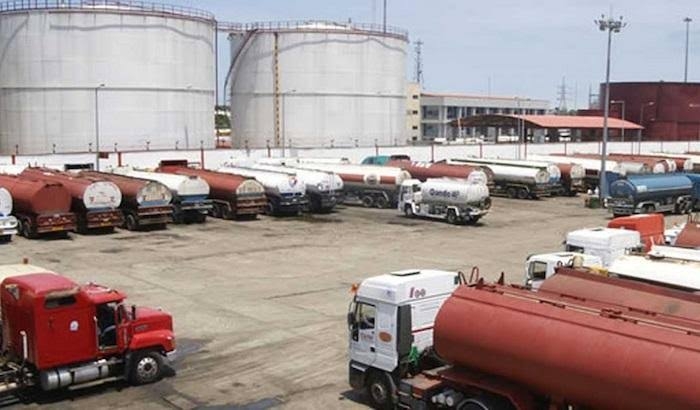A brewing dispute between Lagos State government and petroleum marketers threatens to disrupt fuel distribution nationwide as truck operators suspend operations along the critical Lekki-Epe corridor in protest of a controversial parking fee increase.
The Dispute
The Independent Petroleum Marketers Association of Nigeria (IPMAN), alongside the Nigerian Association of Road Transport Owners (NARTO) and Petroleum Tanker Drivers (PTD), have halted loading activities at Dangote Refinery and Lekki Deep Seaport following the Lagos government’s enforcement of a ₦12,500 electronic call-up parking fee per truck—a five-fold increase from the previous ₦2,500.
The protest, which began Monday, has effectively suspended tanker movement from the strategically important corridor that serves as a key supply route for petroleum products across Lagos and other parts of Nigeria. The Lekki-Epe corridor houses major facilities including the Dangote Refinery, Lekki Deep Sea Port, and the Lekki Free Trade Zone.
Marketers’ Position
Chinedu Ukadike, IPMAN’s National Publicity Secretary, described the new fee as “exorbitant and unbearable,” warning that it would inevitably lead to increased petrol pump prices. “The imposed amount is exorbitant and unbearable for marketers. It will inevitably lead to an increase in the pump price of petrol,” Ukadike stated during an interview with the News Agency of Nigeria.
Dele Tajudeen, immediate past Chairman of IPMAN in the South-West, criticized the policy as serving private interests rather than addressing genuine traffic concerns. “We already pay ₦7,000 at the toll gate. Now, an additional ₦12,500 is being demanded. That’s ₙ19,500 before we even load fuel. And this money, we hear, is going to a private account—not government. This is not sustainable,” he said.
The marketers argue that the levy is being implemented without adequate infrastructure or meaningful stakeholder consultation, and question its necessity given the absence of significant traffic congestion on the corridor.
Government’s Justification
Lagos State officials defend the electronic call-up system as essential for managing increased truck traffic following the operational commencement of Lekki Deep Seaport and expansion of commercial activities in the Lekki Free Trade Zone.
Commissioner for Transportation Oluwaseun Osiyemi emphasized the need for “a sustainable, effective and technology-driven solution” to truck movement management in the corridor. The system, operated through an app called Eto, allows truckers to book slots for port access, similar to the system introduced at Apapa ports.
Bolanle Ogunlola, spokesperson for the Lagos State Ministry of Transport, maintained that the ₦12,500 fee was agreed upon after extensive consultations with stakeholders over two years. “After series of negotiation, we reached that ₦12,500. Initially we planned ₦20,000,” she explained, noting that the government had to balance the needs of various corridor users, including residents and other businesses.
Current Status and Implications
As of Tuesday, tanker activities along the corridor remain suspended, with NARTO President Yusuf Othman confirming that while this is not a formal strike, loading operations have been halted until a reasonable solution is found. “We’ve not declared a strike, only suspended loading at Lekki Port and Dangote Refinery because ₦12,500 per truck is too high,” he explained.
The standoff raises serious concerns about fuel distribution across Nigeria, particularly given the strategic importance of the Lekki-Epe corridor in the country’s petroleum supply chain. Stakeholders from recent meetings have unanimously called for the fee to be reduced back to ₦2,500 to maintain industry stability and prevent potential fuel price increases.
Discussions between the government and industry representatives are ongoing as both sides seek to resolve the dispute before it escalates into a broader fuel supply crisis affecting consumers nationwide.
